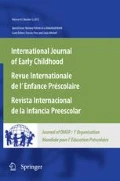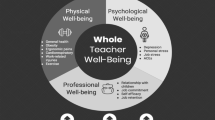Abstract
The capacities of early childhood educators to function well in their work environments are critical to providing high-quality programs for children. Few studies have investigated work-related wellbeing of educators from an organisational perspective. This paper reports findings from a qualitative study that investigated the perspectives about the wellbeing of educators through interviews with nine senior managers employed in ECEC organisations in Australia. Data were drawn from individual interviews and analysed using principles of conventional content analysis. Four themes were identified in the data: health and safety issues (e.g. supports needed to ensure physical and emotional safety); operational challenges (e.g. issues related to work-related stress and importance of recruiting and retaining well-qualified educators); invisibility (e.g. complexities in educator’s work for which the impact on personal wellbeing may not be easily evident to others); supportive adult work environments (e.g. aspects of workplace design, work and staffing practices). The key stakeholders interviewed also identified strategies used to address workplace challenges that impact on educator wellbeing.
Résumé
La capacité des éducateurs de la petite enfance de bien fonctionner dans leur environnement de travail est cruciale pour que des programmes de haute qualité soient offerts aux enfants. Peu d’études se sont penchées sur le bien-être au travail des éducateurs d’un point de vue organisationnel. Cet article présente les conclusions d’une étude qualitative ayant examiné les perspectives sur le bien-être des éducateurs au moyen d’entretiens avec neuf cadres supérieurs employés dans des organisations d’éducation et de garde à la petite enfance (ECEC) en Australie. Les données sont tirées des entretiens individuels et analysées en faisant appel à des principes d’analyse conventionnelle de contenu. Quatre thèmes ont été identifiés dans les données: les questions de santé et sécurité (par ex. le soutien nécessaire pour assurer la sécurité physique et émotionnelle); les défis opérationnels (par ex. les questions relatives au stress lié au travail et l’importance de recruter et retenir des éducateurs bien qualifiés); l’invisibilité (par ex. la complexité du travail des éducateurs, dont l’impact sur le bien-être personnel n’est peut-être pas facilement perçu par les autres); les environnements de travail qui soutiennent les adultes (par ex. la façon de concevoir le lieu de travail, les pratiques de travail et de dotation de personnel). Les intervenants clés interrogés ont également identifié des stratégies utilisées pour relever les défis du lieu de travail ayant un impact sur le bien-être des éducateurs.
Resumen
La capacidad de educadores de preescolar para desempeñarse bien en su ambiente de trabajo resulta crítica para suministrar programas de alta calidad para los niños. Pocos estudios han investigado el bienestar ocupacional de educadores desde una perspectiva organizacional. Este artículo presenta los resultados de un estudio cualitativo centrado en las perspectivas sobre el bienestar de educadores, mediante entrevistas a nueve administradores de organizaciones de Educación y Cuidado Pre-escolar (ECEC por su abreviatura en inglés) en Australia. Se recolectó información de entrevistas individuales. Los datos se analizaron por medio del uso de principios de análisis convencional de contenido. Se identificaron cuatro temas: problemas de salud y seguridad ocupacional (p.ej., suministro de ayudas para asegurar la seguridad física y emocional); retos operacionales (p.ej., problemas relacionados con estrés laboral y la importancia de seleccionar y retener a educadores altamente calificados); invisibilidad (es decir, complejidades en la labor del educador para las cuales el impacto al bienestar personal puede no ser evidente a otras personas); ambientes laborales con apoyo (p.ej., aspectos del diseño del sitio de trabajo y prácticas laborales y de selección de personal). Los entrevistados también identificaron estrategias para combatir retos laborales que impactan el bienestar del educador.
Similar content being viewed by others
Notes
Long day care refers to centre-based child care services aimed primarily at children from birth to school age. These services are typically open for a minimum of 8 h per day, 5 days per week and operate for a minimum of 48 weeks per year and may provide a preschool and kindergarten program. Preschools/kindergartens generally cater for children 3–5 years. They are usually open during school term between the hours 9am–3pm. (Productivity Commission 2019).
References
ACECQA. (2018). National quality standard. Retrieved from https://www.acecqa.gov.au/nqf/national-quality-standard/quality-area-6-collaborative-partnership-with-families-and-communities.
ACECQA. (2019). Qualifications for centre-based services with children preschool age or under. Retrieved from https://www.acecqa.gov.au/qualifications/requirements/children-preschool-age-or-under.
ACECQA. (May, 2019). NQF snapshot Q1 2019. Retrieved from https://www.acecqa.gov.au/sites/default/files/2019-05/NQFSnapshot-Q12019.PDF.
Beamer, G. (2002). Elite interviews and state politics research. State Politics and Policy Quarterly,2(1), 86.
Becher, H., & Dollard, M. (2016). Psychosocial safety climate and better productivity in Australian workplaces: Costs, productivity, presenteeism, absenteeism. Safe Work Australia. Retrieved from https://www.safeworkaustralia.gov.au/doc/psychosocial-safety-climate-and-better-productivity-australian-workplaces-costs-productivity.
Bloechliger, O., & Bauer, G. (2016). Demands and job resources in the child care workforce: Swiss lead teacher and assistant teacher assessments. Early Education and Development,27(7), 1040–1059.
Bouillet, D., Ivanec, T. P., & Mijevic-Ridicki, R. (2014). Preschool teachers’ resilience and their readiness for building children’s resilience. Health Education,114(6), 435–450.
Bullough, R. V., & Hall-Kenyon, K. M. (2018). Preschool teachers’ lives and work: Stories and studies from the field. New York: Routledge.
Bullough, R. V., & Pinnegar, S. (2009). The happiness of teaching (as eudaimonia): Disciplinary knowledge and the threat of performativity. Teachers and Teaching: Theory and Practice,15(2), 241–256.
Corr, L., Davis, E., Cook, K., Waters, E., & LaMontagne, A. D. (2014). Fair relationships and policies to support family day care educators’ mental health: A qualitative study. BMC Public Health. https://doi.org/10.1186/1471-2458-14-1214.
Cumming, T. (2017). Early childhood educators’ well-being: An updated review of the literature. Early Childhood Education Journal,45(5), 583–593.
Cumming, T., & Wong, S. (2019). Towards a holistic conceptualisation of early childhood educators’ work-related well-being. Contemporary Issues in Early Childhood,20(3), 265–281.
Cumming, T., Wulff, E., Wong, S., & Logan, H. (2020). Australia’s hidden hazardous workplaces. Bedrock,25(1), 16–17.
Dexter, L. A. (2006). Elite and specialized interviewing. Colchester: ECPR Press.
Elliott, J. (2005). Using narrative in social research: Qualitative and quantitative approaches. London: Sage Publications.
Grawitch, M. J., Gottschalk, M., & Munz, D. C. (2006). The path to a healthy workplace: A critical review linking healthy workplace practices, employee well-being and organizational improvements. Consulting Psychology Journal: Practice and Research,58(3), 129–147.
Hall, G. B., Dollard, M. F., & Coward, J. (2010). Psychosocial safety climate: Development of the PSC-12. International Journal of Stress Management,17(4), 353–383. https://doi.org/10.1037/a0021320.
Hall-Kenyon, K. M., Bullough, R. V., MacKay, K. L., & Marshall, E. E. (2014). Preschool teacher well-being: A review of the literature. Early Childhood Education Journal,42(3), 153–162.
Hsieh, H. F., & Shannon, S. E. (2005). Three approaches to qualitative content analysis. Qualitative Health Research,15(9), 1277–1288.
Irvine, S., Thorpe, K., McDonald, P., Lunn, J., & Sumsion, J. (2016). Money, love and identity: Initial findings from the National ECEC Workforce Study. Summary report from the national ECEC Workforce Development Policy Workshop, Brisbane, Queensland: QUT.
Jeon, L., Buettner, C., & Grant, A. (2018). Early childhood teachers’ psychological well-being: Exploring potential predictors of depression, stress, and emotional exhaustion. Early Education and Development,29(1), 53–69.
Jorde Bloom, P. (1988). Factors influencing overall job satisfaction and organizational commitment in early childhood work environments. Journal of Research in Childhood Education,3(2), 107–122.
Joseph, B., Walker, A., & Fuller-Tyszkiewicz, M. (2018). Evaluating the effectiveness of employee assistance programmes: A systematic review. European Journal of Work and Organizational Psychology,27(1), 1–15.
Kalliath, T., & Kalliath, P. (2012). Changing work environments and employee wellbeing: An introduction. International Journal of Manpower,33(7), 729–737.
King, N., Horrocks, C., & Brooks, J. (2019). Interviews in qualitative research (2nd ed.). London: Sage.
King, E. K., Johnson, A. V., Cassidy, D. J., et al. (2015). Preschool teachers’ financial well-being and work time supports: Associations with children’s emotional expressions and behaviors in classrooms. Early Childhood Education Journal,44(6), 545–553.
Kusma, B., Groneberg, D. A., Nienhaus, A., et al. (2012). Determinants of day care teachers’ job satisfaction. Central European Journal of Public Health,20(3), 191–198.
Kuykendall, L., & Tay, L. (2015). Employee subjective well-being and physiological functioning: An integrative model. Health Psychology Open,2(1), 1–11.
LaMontagne, A. D., Keegel, T., & Vallance, D. (2007). Protecting and promoting mental health in the workplace: Developing a systems approach to job stress. Health Promotion Journal of Australia,18(3), 221–228. https://doi.org/10.1071/he07221.
Løvgren, M. (2016). Emotional exhaustion in day-care workers. European Early Childhood Education Research Journal,24(1), 157–167.
Mikecz, R. (2012). Interviewing elites: Addressing methodological issues. Qualitative Inquiry,18(6), 482–493.
Pascoe, S., & Brennan, D. (2017). Lifting our game. Report of the review to achieve educational excellence in Australian schools through early childhood interventions. Retrieved from https://education.nsw.gov.au/early-childhood-education/whats-happening-in-the-early-childhood-education-sector/lifting-our-game-report/Lifting-Our-Game-Final-Report.pdf.
Productivity Commission. (2019). Report on government services. Retrieved from https://www.pc.gov.au/research/ongoing/report-on-government-services/2019/child-care-education-and-training/early-childhood-education-and-care.
Ryan, S., & Whitebook, M. (2012). More than teachers: The early care and education workforce. In B. Pianta (Ed.), Handbook of early education (pp. 92–110). New York: Guilford Press.
Safe Work Australia. (2015). Cost of injury and illness statistics. Retrieved from https://www.safeworkaustralia.gov.au/statistics-and-research/statistics/cost-injury-and-illness/cost-injury-and-illness-statistics.
Schreyer, I., & Krause, M. (2016). Pedagogical staff in children’s day care centres in Germany—Links between working conditions, job satisfaction, commitment and work-related stress. Early Years,36(2), 132–147.
Waniganayake, M., Cheeseman, S., Fenech, M., Hadley, F., & Shepherd, W. (2017). Leadership: Contexts and complexities in early childhood education (2nd ed.). South Melbourne: Oxford University Press.
Whitaker, R., Dearth-Wesley, T., & Gooze, R. (2015). Workplace stress and the quality of teacher–children relationships in Head Start. Early Childhood Research Quarterly,30, 57–69.
Whitebook, M., King, E., Philipp, G., & Sakai, L. (2016). Teachers’ voices: Work environment conditions that impact teacher practice and program quality. Berkeley, CA: Center for the Study of Child Care Employment.
Wong, Y., & Zhang, L. (2014). Perceived school culture, personality types, and wellbeing among kindergarten teachers in Hong Kong. Australasian Journal of Early Childhood,39(2), 100.
Zinsser, K., Denham, S., Curby, T., & Chazan-Cohen, R. (2016). Early childhood directors as socializers of emotional climate. Learning Environments Research,19(2), 267–290.
Acknowledgements
The authors would like to thank the anonymous reviewers who provided valuable advice on an earlier draft of this article.
Author information
Authors and Affiliations
Corresponding author
Additional information
Publisher's Note
Springer Nature remains neutral with regard to jurisdictional claims in published maps and institutional affiliations.
Appendix: Interview Questions
Appendix: Interview Questions
-
1.
Can we begin by discussing your role here in [organisation X]? What’s involved? What areas do you oversee?
-
2.
How do you understand educator wellbeing?
-
3.
Educator wellbeing is becoming increasingly important. Why is it important? And why is it important for your organisation?
-
4.
What approaches does your organisation take to supporting educator wellbeing?
-
5.
What factors do you think influence educator wellbeing?
-
6.
How would you describe the turnover rate of staff? Does it vary much from year to year?
-
7.
Do you see any patterns related to staff turnover?
-
8.
Could you comment on staff turnover rates and job descriptions?
-
9.
Could you comment on staff turnover rates and qualifications?
-
10.
Are staff turnover rates related to any particular factors? (For instance, is there a relationship between age and years of experience?)
-
11.
Can you give me an indication of the cost of claims for:
Sick days (per annum)?
Cost of injuries?
Cost of recruitment?
-
12.
Does the cost of casual staff vary much from year to year?
-
13.
What sort of injuries to EC educators commonly experience?
-
14.
What sort of illnesses to EC educators commonly experience?
-
15.
What sort of reasons do staff give for leaving the organisation?
Prompts: Other questions to elicit more information could be added such as:
Can you tell me more about what you mean by that? And
Can you talk me through the last time a situation like that affected your decisions about educator wellbeing?
What happened then?
So, what did that mean for your practice/organisation?
Rights and permissions
About this article
Cite this article
Logan, H., Cumming, T. & Wong, S. Sustaining the Work-Related Wellbeing of Early Childhood Educators: Perspectives from Key Stakeholders in Early Childhood Organisations. IJEC 52, 95–113 (2020). https://doi.org/10.1007/s13158-020-00264-6
Published:
Issue Date:
DOI: https://doi.org/10.1007/s13158-020-00264-6



